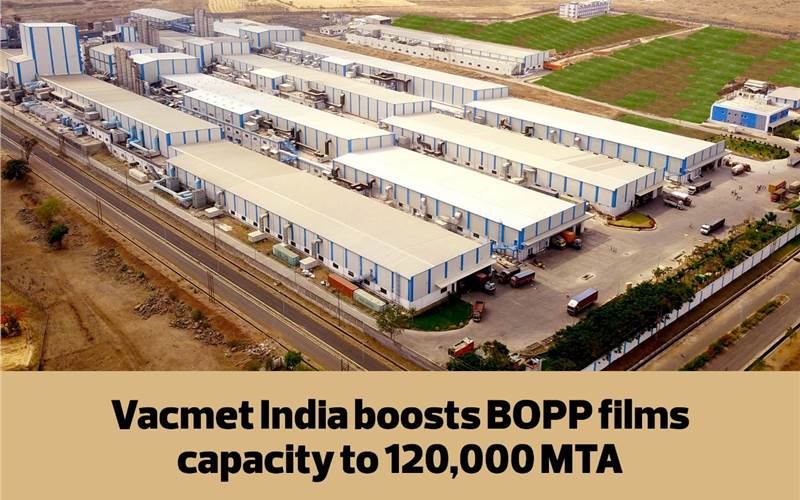Vacmet India boosts BOPP film capacity to 120,000 MTA
Vacmet India has commissioned a third BOPP film line at the company’s existing production facility near Indore in the last quarter. It is a 10.4 metres wide line having a capacity of 55,000 MT per annum. Charmiane Alexander reports
08 Jul 2022 | By WhatPackaging? Team
With the commissioning of the BOPP line, Vacmet's capacity has reached to 1,20,000 MT per annum for Biaxially Oriented Polypropylene (BOPP) films. With this capacity addition, the group shall be able to offer faster deliveries along with an enlarged product portfolio.
SC Kapoor, president- operations at Vacmet said,"It is a three-layer, 10.4 metre wide, state of the art fully automated line from Bruckner with capacity of 55,000 metric tonnes per annum. The line can produce films from 12- 60 microns. This high-speed line with automated changeovers and automatic consumption of waste shall not just help us in improving overall efficiencies when running various product mixes but will also considerably reduce waste."
The production capacity of 55,000 MT per annum is expected to benefit the industry in terms of meeting the enhanced demand of BOPP films. This has been emanating from growth in packaged food in the backdrop of the pandemic. As per WhatPackaging? magazine, there has been a spurt in demand for flexible packaging material, required for newer categories of precautionary and wellness products post-Covid and massive scale-up of modern retail and e-commerce businesses.

Kapoor added, "More capacity expansion by Vacmet will further boost the confidence of brand owners trying to shift to BOPP, owing to its ease of recycling with the same family structures." The film line also supports thicker microns which is in line with the government’s waste management regulations recommending the industry to use films which weigh more than 50 microns.
With new developments in the pipeline, Vacmet's focus is to produce and promote products with "more recyclable content and more product supporting sustainability in BOPP". Plus there is an attempt to create customised packaging solutions and barrier-BOPP films with sustainable properties.
This is part of Vacmet’s sustainable packaging message to the industry. Kapoor shared with WhatPackaging? magazine, "Circular economy is a powerful and potent concept as far as plastics and packaging waste is concerned. All of us must support reduction, reuse, and recycling of plastic material in whichever format we can. The Plastic Waste Management Rules and Amendments that the Government of India is coming up with from time to time will help in improving sustainability and recycling of plastics."
And so, Vacmet, has been working on the circular economy and a few other sustainability initiatives for quite some time now. Kapoor added, "We are a stakeholder in the CEFLEX initiative to get the circular economy infrastructure in place." At product level, Vacmet offers Recycled PET films. We offer several films to facilitate single family laminates enabling ease of recycling. We also work on designing laminate solutions which reduce use of plastic consumed per pack."

One category of films which is noteworthy to mention is the Alox coated films which have see-through/transparent high barrier and are offered in both BOPP and BOPET. The Alox coated films work well in two-ply laminate structures as the coated layer works both as a printing as well as barrier layer. Moreover, the product helps with down gauging as the barrier values are not dependent on the thickness of the film.
At the Vacmet manufacturing facilities, the team has carried out measures like installation of waste to energy conversion plants; use of biomass for energy production; use of solar energy, rainwater harvesting, and zero effluent discharge. These measures are part of an ongoing exercise of Vacmet’s commitment towards making its plants environment-friendly and reduce its carbon footprint.
In addition to the BOPP line, Vacment has commissioned its fourth polyester film line in India. This new 8.7-metres-wide line is also based in Indore with a production capacity of 36,000 MT per annum.












 See All
See All